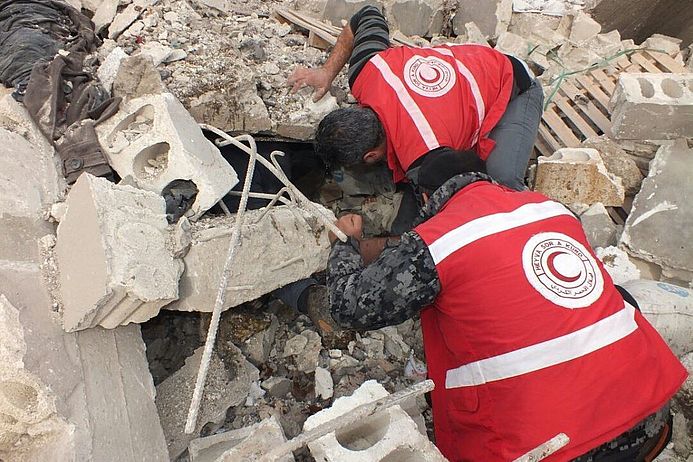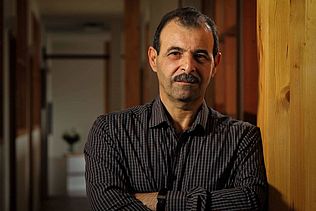By Anita Starosta.
For many years now, medico is supporting the efforts of the Kurdish-dominated self-administration in northern Syria to establish a democratic community. At the start of 2018 medico received a cry for help from a region which so far has remained largely spared the effects of the Syrian war – Afrin. This canton, in northwestern Syria, has been home for centuries for Kurds and numerous religious minorities, such as Christians, Yazidis and Turkish Alevites, all living peacefully together. On 20 January, the Turkish army crossed the border. The campaign is a recent effort by Turkey by all means necessary to prevent a self-administration in northern Syria.
The Kurdish Red Crescent operates the only local hospital in Afrin, which is now urgently dependent on aid. medico is providing support. In the face of the advance by the Turkish army, large parts of the population initially fled from the villages of the canton to the city of Afrin. Vice versa, emergency aid workers risked their lives to travel to the affected villages. They treated the victims of the air attacks for as long as possible.
The seriously injured were taken to the hospital in Afrin. Doctors and nurses worked around the clock. Gradually, they ran out of almost everything – food and water, drugs and operating supplies. At the start of March a bomb hit the Afrin hospital, and shortly afterwards the Turkish army moved into the city. Together with around 140,000 civilians, the emergency aid workers and staff of the local city administration fled in a convoy. The refugees found shelter further south in Sheba. There was no direct access to the other Kurdish autonomous regions in northern Syria. People were boxed in and cut off. medico called for donations. Despite the difficult local political conditions, deliveries of aid supplies gradually reached the region, camps could be set up and people housed. The Kurdish Red Crescent took care of health services. A year later, there are still around 100,000 people in Sheba who are dependent on outside help. So far they have not given up hope of returning to their home villages one day. However, Turkey is creating facts: hosting Syrian refugees from other parts of the country in Afrin’s villages. Ankara is pursuing a full-out policy of demographic remodeling, pushing the islamisation of the region.
The self-administration is also unstable in the other areas of northern Syria. Despite the threat of a Turkish invasion here as well, the Kurds are still trying to establish a democratic alternative in this country ravaged by civil war. This self-determination project urgently needs more supporters on the world political stage. Instead, it is being repeatedly left high and dry. Germany is directly involved in this. In front of the eyes of the world, the Turkish army used Leopard tanks in its war of aggression in Afrin, manufactured in and delivered by Germany. The war by Turkey, a NATO partner, is in violation of international law, but is nevertheless tolerated. The German government even refuses to accept responsibility for the IS fighters and their families captured and held by the Kurdish forces. Even those with a German passport are not being repatriated. The West is adding this extra burden to the emancipatory project in northern Syria, which is already fragile.


